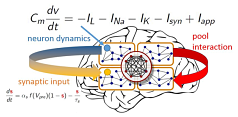Focus on Modelling and Analysis in Biomedical Sciences
Research in biomedical sciences increasingly involves mathematical modelling as a support to validate theories, to test computational replicas, to manage biomedical data and to deal with new challenges that are hard to explore either clinically or experimentally. All these goals require scientists with the solid basis provided in standard mathematical undergraduate programs, but also equipped with advanced mathematical and computational tools, as well as a practical spirit, to serve at the interface of biology, medicine, mathematics and computation. Fortunately, while the MAMME program gives the opportunity of acquiring a basic knowledge of mathematical models in biology and advanced mathematical/computational tools, other master's programs at UPC, allow offering a complete training to prepare our students in this stimulating interdisciplinary area. Students interested in joining this area through the MAMME will receive advice from the master's coordination to tailor their curriculum according to different scopes in mathematical modelling of biomedical sciences. We aim at giving a broad training in the mathematical modelling of medically significant biological problems and, additionally, endow their careers with an initial subfocus in some specific problems. The list of courses below represent the wide offer at the UPC to tailor specific profiles (the student has to select 45 ECTS from it), which can be also complemented with problem-oriented master's theses (for example, study of phylogenetic trees, mathematical and computational neuroscience, electro-mechanical models in cardiac physiology, mathematical epidemiology,...), eventually co-advised with partners in biomedical labs. Researchers involved in the area offer their advice to adapt the curriculum to each student’s background and interests.

Brain dynamics: modelling and analysis at different levels, with different tools (differential equations, graphs, statistics,...)

Simulation of curved cellular monolayers with computational mechanics
| Mathematical models in biology | 7.5 ECTS | English | MAMME |
| Numerical Methods for dynamical systems | 7.5 ECTS | English | MAMME |
| Mathematical Modeling with PDEs | 7.5 ECTS | English | MAMME |
| Numerical Methods for PDEs | 7.5 ECTS | English | MAMME |
| Computational Mechanics | 7.5 ECTS | English | MAMME |
| Qualitative and quantitative methods in dynamical systems | 7.5 ECTS | English | MAMME |
| Graph theory | 7.5 ECTS | English | MAMME |
| Inferencia estadística avanzada | 5 ECTS | Spanish | MESIO UPC-UB |
| Fundamentos de bioinformática | 5 ECTS | Spanish | MESIO UPC-UB |
| Multivariate data analysis | 5 ECTS | Spanish-English | MESIO UPC-UB |
| Probability and stochastic processes | 5 ECTS | English | MESIO UPC-UB |
| Time series | 5 ECTS | Spanish-English | MESIO UPC-UB |
| Numerical Modeling* | 9 ECTS | English | Màster en Enginyeria de Camins, Canals i Ports, UPC |
| Técnicas básicas en neurociencia** | 2.5 ECTS | Màster official en neurociencia, UB-UPF-UDL-URV | |
| Biología Celular y Molecular de la Neurona** | 3 ECTS | Màster official en neurociencia, UB-UPF-UDL-URV | |
| Diseño y análisis de datos en neurociencia cognitive** | 2.5 ECTS | Màster official en neurociencia, UB-UPF-UDL-URV | |
| Neurociencia computacional** | 2.5 ECTS | Màster official en neurociencia, UB-UPF-UDL-URV |
We remind that a minimum of 3 MAMME courses (22.5 ECTS) is mandatory.
(*) “Numerical Modeling” is recommended to students that do not have a solid background in numerical methods and programming. Registration to this course requires the approval of the director of the corresponding master.
(**) These courses are proposed to students willing to get a deeper focus neuroscience. Registration to these courses requires the approval of the director of the corresponding master.
Share: